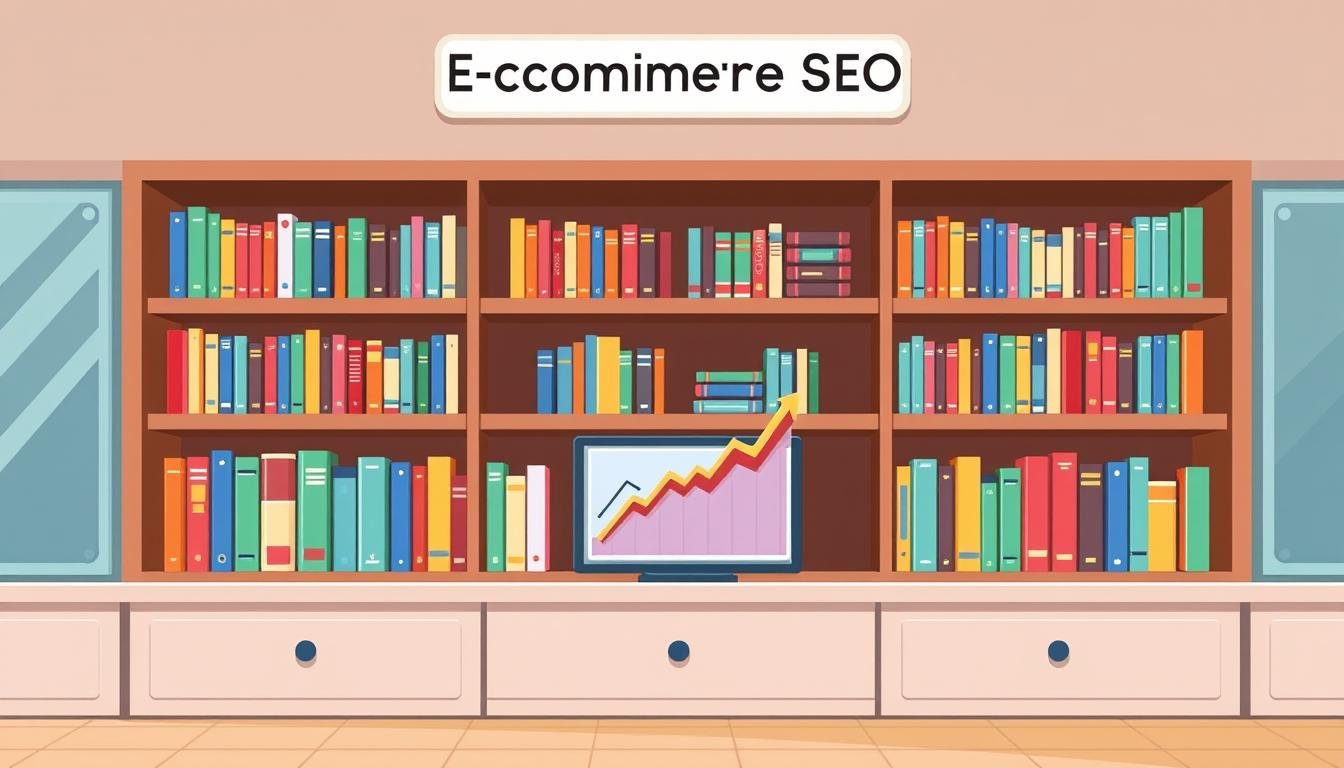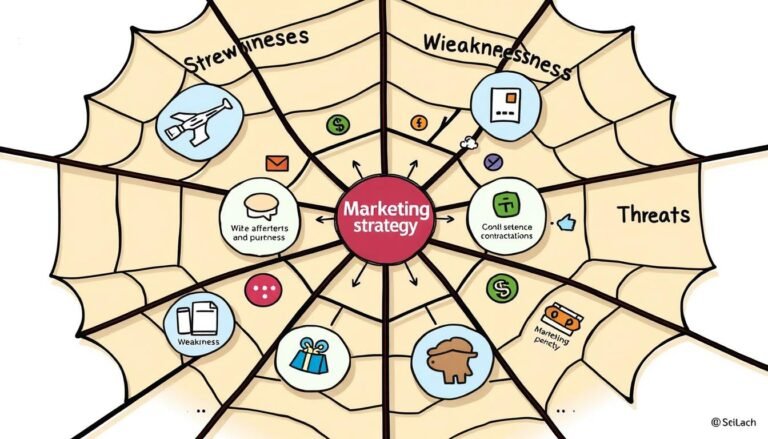The Ultimate Guide to E-commerce SEO Best Practices
Did you know that organic search results get 80 to 90 percent more clicks than ads? This fact shows how vital search engine optimization (SEO) is for online stores. We’ll cover the key ecommerce SEO strategies to boost your online store’s visibility and attract more customers.
This guide will focus on keyword research, site structure, on-page SEO, and technical aspects. These strategies will help improve your store’s search results ranking. By using these tips, you can make sure your online store ranks well, gets more traffic, and increases sales.
Key Takeaways
- Effective SEO can drive significantly more organic traffic to your online store.
- Long-tail keywords typically convert better and are less competitive.
- Tools like SEMrush and Google Keyword Planner can improve your keyword research.
- A well-structured website makes it easier for search engines to index it.
- First-page Google results get 95% of user traffic, highlighting the importance of SEO.
- Good site navigation is key for a great user experience and SEO success.
- Adding valuable non-product pages can boost site relevance and SEO performance.
Understanding Ecommerce SEO
Ecommerce SEO helps make online stores more visible in search engines. It guides customers to e-commerce sites, making it key for success online. A good SEO strategy looks at important parts like product pages and site structure to bring in more traffic.
What is Ecommerce SEO?
Ecommerce SEO makes online stores more attractive to potential customers. By improving different parts of the site, businesses gain many benefits. This means more people looking to buy specific products are more likely to find and buy from them.
Improving things like site speed and how it works on mobiles is also crucial. It makes users more likely to stay and buy things.
The Importance of SEO for Online Stores
SEO is very important for online stores. It’s cheaper than ads and brings in more traffic over time. A good SEO plan helps make a brand more recognized and trusted, as people trust organic results more than ads.
Businesses that understand this use keyword research to improve their SEO. This helps them be more visible in search engines.
Why Ecommerce Websites Care About SEO
Ecommerce businesses need to be seen online to succeed. The digital market is very competitive. They must use search engine optimization (SEO) to stand out.
Visibility in Search Engine Results
Most people look at the first page of search results. They rarely go beyond that. So, ecommerce sites need good SEO to show up higher.
By improving their SEO, companies can move up in search results. This means more people see their products. It also makes them look more trustworthy.
The Impact of Ranking on Traffic
Where a website ranks in search results affects its traffic. The top result gets about 27.6% of all clicks. This shows how important ranking is for getting visitors.
Being higher up in search results means more people come to the site. This leads to more sales and a competitive edge. SEO is a key way for businesses to get more organic traffic. It’s better than traditional marketing.
Ecommerce Keyword Research Strategies
Finding the right ecommerce keyword research strategies is key to getting noticed online and drawing in customers. Knowing what keywords your audience uses can greatly boost your site’s traffic and performance. By choosing the right keywords, online stores can make their content more visible and rank better in search engines.
Identifying High-Value Keywords
Start by picking high-value keywords for ecommerce that match what users are looking for. Begin by thinking of terms your potential customers might use when searching for your products. Long-tail keywords are great because they’re less competitive and more likely to convert. These are specific phrases that target people closer to making a purchase.
To find relevant keywords, do a content gap analysis. This shows you which keywords your competitors rank for but you don’t. Knowing this helps shape your keyword strategy.
Using Tools for Keyword Research
Keyword research tools are vital for finding and understanding search terms. Google Keyword Planner gives you insights on search volume and cost-per-click (CPC). This helps you see which keywords are worth your time and can drive traffic to your store.
Tools like Semrush and Ahrefs offer more data to help with keyword difficulty analysis. This shows how hard it might be to rank for certain keywords. Keeping an eye on your keyword rankings with Google Search Console and Google Analytics keeps your optimization up to date with market trends and user needs.
| Keyword Research Tool | Features | Benefits |
|---|---|---|
| Google Keyword Planner | Search volume, CPC data | Identifies high-traffic keywords |
| Semrush | Keyword difficulty analysis | Insights on competitors’ strategies |
| Ahrefs | Backlink analysis | Strengthens link-building efforts |
| Google Search Console | Monitoring rankings | Improves site’s visibility |
| Google Analytics | User behavior tracking | Aids in understanding traffic sources |
Using these ecommerce keyword research strategies makes sure your content connects with potential customers. It also helps optimize your online store with the right keywords.
Site Architecture for Enhanced User Experience
The way an ecommerce site is set up greatly affects its SEO and how users feel. Making sure the site is easy for search engines to read is key. A well-organized site helps search engines and makes customers happy by being easy to use. By focusing on making the site easy to navigate, businesses can improve the user experience through SEO.
Why Structure Matters for SEO
A clean, organized site is crucial for ecommerce success. When customers quickly find what they need, they stay on the site longer and buy more. Here are some reasons why site structure is so important:
- Ease of Navigation: Clear paths let users find products fast, making them happier.
- Improved Crawlability: Search engines like simple sites, which can lead to better rankings.
- Hierarchy Creation: Categories and subcategories help organize and grow with more products.
Best Practices for Site Navigation
To make the most of site navigation, ecommerce sites should follow these tips:
- Use simple menus that guide users through the site easily.
- Keep product pages within three clicks from the homepage to avoid frustration.
- Use breadcrumbs to help users find their way back.
- Internal links help improve site structure and boost page authority.
- Short, keyword-rich URLs help both users and search engines.
On-Page SEO Techniques for Ecommerce
On-page SEO techniques are key for ecommerce success. They help make online stores more visible and effective. By optimizing product descriptions, title tags, and meta descriptions, you can boost search rankings and engage users better. These elements are crucial for customers, giving them a sneak peek into what they’ll get from a product.
Optimizing Product Descriptions
Writing great product descriptions means knowing what customers are looking for. To optimize product pages, use keywords in a natural way. Include not just specs, but also what makes the product special. Make it clear and engaging to turn visitors into buyers.
Improving Title Tags and Meta Descriptions
For better SEO, make title tags concise and to the point, including key words. A good title tag can really boost click-through rates from search engines. Meta descriptions should be both informative and enticing, pushing users to click. Both should match the page’s content and grab potential customers’ attention from the start.
| Element | Best Practice | Impact |
|---|---|---|
| Product Descriptions | Use relevant keywords and highlight unique features | Increases relevance and engagement |
| Title Tags | Keep it concise and include primary keywords | Improves click-through rates |
| Meta Descriptions | Craft informative and persuasive snippets | Encourages higher click rates from SERPs |
Technical SEO Essentials for Ecommerce
In the world of online shopping, making technical SEO improvements is key. Things like page speed improvements and mobile optimization for ecommerce help keep customers and boost search engine rankings.
Page Speed and Mobile Optimization
Improving page speed is crucial for ecommerce sites. Slow sites can lead to high bounce rates, hurting user satisfaction and rankings. Fast-loading pages make shopping fun, which is important since more people shop on mobiles.
With mobile making up a big part of online traffic, focusing on mobile optimization for ecommerce is a must. It makes sure users can shop easily, which helps with engagement and sales.
Handling Duplicate Content and Indexing
Dealing with duplicate content is also key in SEO. Without good management, duplicate pages can fight over the same keywords, hurting visibility and rankings. Using canonical tags and noindex directives helps search engines know which content to show first.
This way, ecommerce sites can get better indexed and have a better shot at being in the top search results. The first five organic results get a lot of clicks, so being there is important.
The Ultimate Guide to E-commerce SEO Best Practices
Creating quality content is key for ecommerce success. Starting a blog helps engage visitors and attract more people with targeted content. It lets businesses answer common questions, share product insights, and use long-tail keywords. This approach builds trust and authority, which is great for ecommerce SEO.
Creating Quality Content and Blogging
When ecommerce businesses focus on quality content, they connect better with their audience and boost SEO. Blogs are great for sharing stories, news, and product details. Regular updates help with visibility and can turn visitors into loyal customers.
Using the right keywords makes content easier to find for both search engines and users. This helps with indexing and finding useful information.
Link Building for Ecommerce Success
Link building is crucial for ecommerce SEO. Getting backlinks from trusted sites boosts site authority and search rankings. Working with influencers, guest posting, and community engagement can get you valuable backlinks.
Each link is like a vote of confidence, making your store more trustworthy. A smart link-building strategy, along with other SEO practices, increases brand visibility. This leads to more traffic and sales.
Conclusion
An effective ecommerce SEO strategy is key for online retailers to succeed. By following the best practices for ecommerce, merchants can boost their visibility and create a better user experience. This approach helps businesses grow and increase their revenue.
Having a strong ecommerce SEO plan does more than just bring in traffic. It helps brands connect with their audience better, reducing the need for paid ads. It also builds trust and authority in the market. Key elements like keyword research, technical SEO, and solid internal linking are important for success.
It’s important to remember that SEO is an ongoing process, not a one-time task. Staying updated with trends and adapting helps ecommerce businesses stay competitive. By seeing SEO as a long-term strategy, online retailers can achieve lasting success and higher profits.
Source Links
- Ecommerce SEO: The Definitive Guide [2024]
- eCommerce SEO Best Practices: The Ultimate Guide!
- The Ultimate Guide to E-commerce SEO (Updated 2024) – BlueTuskr
- The Ultimate eCommerce SEO Guide For 2024: All You Need to Know to Rank Higher in Search
- The Industry Leading Ecommerce SEO Guide (2024) – Shopify
- Ecommerce SEO: How Online Stores Can Drive Organic Traffic
- The Ultimate Guide to E-commerce SEO – Wytlabs
- 2024 eCommerce SEO Strategies & Best Practices
- Inflow’s 5-Step eCommerce Keyword Research Strategy
- E-commerce SEO: The Complete Guide (2024)
- Ecommerce SEO: The Ultimate Guide to Boost Sales in 2023
- E-commerce SEO Best Practices: The Ultimate Guide
- Guide to On-Page SEO for eCommerce | TinyIMG
- Ecommerce SEO: A Simple Guide for Beginners
- Ecommerce SEO guide for beginners (that won’t cause your head to spin)
- Beginner’s Guide to eCommerce SEO: Best Tips & Tools
- Huge E-Commerce SEO Guide (Advanced Traffic Techniques That WORK!)
- The Ultimate Guide to E-Commerce SEO
- The Ultimate Guide to E-commerce SEO | Tips, Tools, and Best Practices
- Ecommerce SEO Guide: SEO Best Practices for Ecommerce Website
- The Ultimate Guide to ecommerce SEO: Boost Your Store’s Visibility
- The Ultimate Guide to E-commerce SEO | Locad








